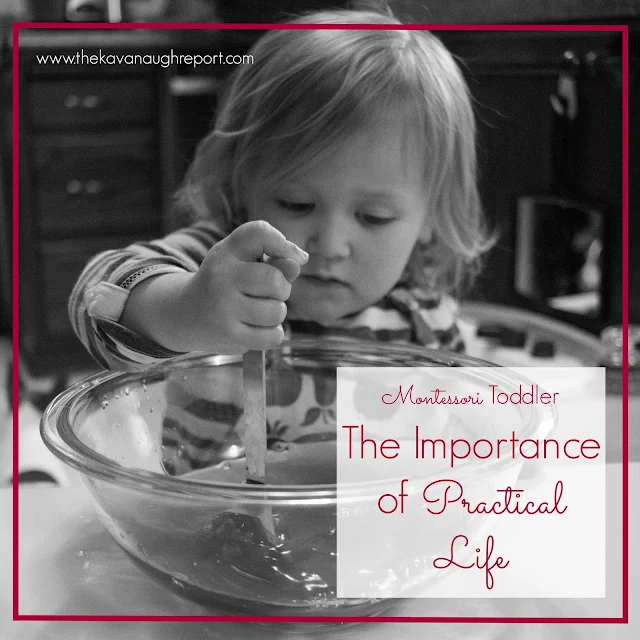The other day, I was chatting on the phone with my lovely friend, Amy from Midwest Montessori. As we chatted, it was quiet time and the house remained quite calm as Gus slept and Nora did her thing. I was picking things up and walked into my kitchen to find Nora quietly juicing an orange. It was one of many times recently that I have realized how big Nora is getting.
At nearly 3, Nora is in the sort of in the "golden age" of practical life. She's at the point where she can independently carry out fairly large practical tasks without much help. But, after posting a video of her making eggs, I got an excellent question about why practical life activities are important. What is the importance of Montessori practical life? Why do these activities at all? Wouldn't your kids appreciate you doing these tasks for them?
There's a misconception floating around in the world that children would rather be catered to, then engage in this type of work. It's an idea that the practical is somehow a chore that should be avoided. I think this perception comes from a different view on child development. Maria Montessori observed that children were FAR less interested in pretend play and artificial experiences than they were participating in the real, practical life at home and school.
Given the opportunities, children get real and lasting joy, and confidence from completing these practical tasks. For them, it is not work. They don't see or have the same negative connotations about practical chores that we as adults have. It's something they need and crave.
"Because he is in love with his environment and not indifferent to it, a child's intelligence can see what is invisible to adults." Maria Montessori, The Secret of Childhood
Practical life tasks serve so many purposes. Not only do they help a child develop concentration and fine motor skills, but they also help to develop sequential thinking that will be important for math work later on. These fine motor skills are important for being able to read. They give kids the hand strength they need to do the sand paper letters, for example, or the dexterity to correctly hold a writing utensil. Practical life activities also help Montessori children to develop a unique confidence through these sensory heavy experiences. It gives them the experience and internal dialogue to know that they can conquer big tasks. They have it!
Maybe most importantly, practical life helps to define a child's role within their family. By helping to provide a useful role within the family, a toddler learns just how important they are. The child learns social graces, gains a feeling of satisfaction, and begins to make sense of the world around them.
"A child gains experience through exercise and movement. He coordinates his own movements and records the emotions he experiences in coming into contact with the external world. These help to mold his intelligence... by means of his constant effort, experiences, sorrows, and conquests of difficult trials and struggles, a child slowly perfect his activities. An adult can assist in shaping the environment, but it is the child that perfects his own being." Maria Montessori, Secret of Childhood
It's this feeling of belonging, of mattering, or being so important that I think drives most toddlers to so much practical life. It's the joy they feel when they can actively contribute to this big wonderful world around them. When they can positively impact the people they love the most.
But, does this mean they always want to? No. Nora is not asked, required, or told to engage in ANY cooking/cleaning/practical activity. In fact, I don't even require her to dress most days. These are decisions she is making based on her own observations and drives within the environment. These are her choices, and ultimately her joy. If she wants me to make her eggs or her lunch, or help her get dressed, I happily agree.
If she wants to make jello for dessert for the family, I also happily agree. And, I try to step back and let it happen. I follow the child in everything.
Do your children love practical life? Do you agree that it is some of the most important toddler work?







